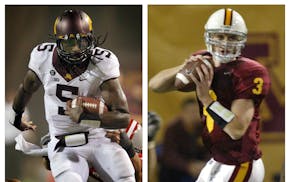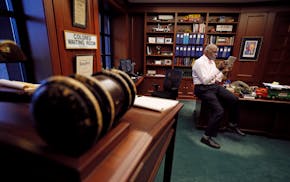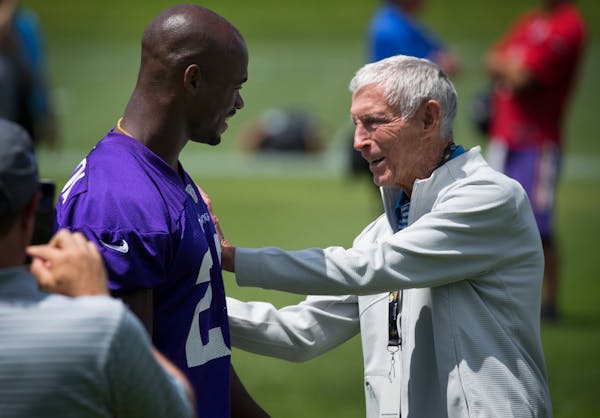Jerry Burns, who won two Super Bowls as a Packers assistant before becoming one of the more lovable characters in Vikings history, died Wednesday after a long battle with failing health.
"Burnsie" was 94.
"I'm gonna miss him," Vikings Hall of Fame coach Bud Grant said in a statement.
Born Jan. 24, 1927 in Detroit, Burns played quarterback at the University of Michigan and then spent the next four decades in coaching before retiring as Vikings head coach in 1991. His 24-year stint with the Purple, which included 18 seasons as one of the league's most innovative offensive coordinators of his day, earned Burns a place in the Vikings Ring of Honor.
"He was a brilliant, brilliant coach," Vikings Hall of Fame quarterback Fran Tarkenton said in a statement. "He enabled me to be better than I was. We worked together so closely for so long and nobody ever had more fun doing it. We were laughing, yelling and screaming, but never had a cross word to each other.
"Without him, I would never have done what I did. He was critical to the success of the Vikings of that era. He was so important to our success."
Burns coached the University of Iowa to a 16-27-2 record before Vince Lombardi brought him into the NFL as defensive backs coach in 1966. Burns helped the Packers win Super Bowls I and II.
"I met 'Burnsie' at Iowa when he picked me up from the airport when I was visiting down there, and from that point on, we started talking football and never stopped," Grant said. "We were on the same page a lot. When I went to Winnipeg [as coach of the Canadian Football League's Blue Bombers from 1957-66], I'd have him come up as a guest coach. Our friendship grew over the years, and we became very close friends and so did our families.
"When I got the job in Minnesota [in 1967], I talked to him about coming here, but he had a contract with Green Bay. The first year I was at the Vikings, I coached one guy short. I was holding the job for 'Burnsie' until he could come the next year. He was a very astute football mind. He could see things on the field immediately. He was as important to my career as anyone I've been involved with. His coaching help, friendship, loyalty, family — he brought everything to the Vikings he had."
Burns' switch to coaching offense helped the Vikings reach four of the first 11 Super Bowls during the 1970s. Burns' offense was ahead of its time.
“Burnsie made me laugh and made me smile even if he was 2,000 miles away. He made everybody smile. He was one of the most unique characters we've ever known, but it didn't hide his brilliance. I spent the last seven years of my career with Burnsie and he saved my life.”
In fact, a point of contention for many Burns and Vikings loyalists is the naming of the "West Coast" offense. Bill Walsh's 49ers earned the honor by winning four Super Bowls in the 1980s, but Burns was running a similar scheme — one that helped running back Chuck Foreman lead the league in receptions with 73 in 1975 — a decade earlier.
"Jerry Burns was … a foundation of this franchise," the Wilf family, which bought the Vikings in 2005, said in a statement. "His leadership as a coordinator and head coach for over two decades shaped some of the most successful teams in Vikings history. His love of life, quick smile and sense of humor were what we will remember most. We join Vikings fans worldwide in sending our prayers to his family."
Burns' first job came in 1951 as head baseball coach and assistant football coach at the University of Hawaii. After a year coaching basketball and football at Whittier College and another year at St. Mary's of Redford (Mich.) High School, Burns left for Iowa, where he was an assistant football coach for seven seasons before becoming head coach.
After Grant retired for the second and final time, Burns was named Vikings head coach, correcting the mistake of hiring Les Steckel after Grant's first retirement before the 1984 season.
Burns became one of the more charismatic leaders and a fan favorite during his head coaching run. His colorfully worded tirade in defense of offensive coordinator Bob Schnelker during a 1989 news conference became an instant classic and is must-see YouTube material.
" 'Burnsie' made me laugh and made me smile even if he was 2,000 miles away," Tarkenton said. "He made everybody smile. He was one of the most unique characters we've ever known, but it didn't hide his brilliance. I spent the last seven years of my career with 'Burnsie' and he saved my life."
By Burns' side every step in his career was his wife, Marlyn. They had five children together.
Burns' head coaching highlights were winning the 1989 NFC Central and the amazing playoff run during the 1987 strike season. Finishing the 1987 regular season 8-7 — thanks to an 0-3 record by the league's worst replacement team — Burns' Vikings got hot in the postseason, upsetting the Saints 44-10 in New Orleans and the No. 1-seeded 49ers 36-24 in San Francisco.
Facing No. 2-seeded Washington on the road in the NFC title game, the Vikings were trailing 17-10 and were inside the Washington 10-yard line when Darrin Nelson dropped what should have been a touchdown pass from Wade Wilson with 52 seconds left. Washington went on to rout the Broncos 42-10 in the Super Bowl as Vikings fans were left with yet another heartache despite Burnsie's unlikely postseason run.
"From the day I started with the Vikings, Jerry Burns was a great friend and someone I loved spending time with," Vikings coach Mike Zimmer said in a statement. "He had a unique outlook on the game, and I learned something every time we talked. The football world lost a great one today."

Former Gophers football standouts embrace being basketball dads

Reusse: Once-formidable Twins starting rotation vulnerable without López

Twins lose second in a row to Blue Jays as bullpen falters late
What is the 'House settlement,' and what does it mean for the Gophers and NCAA?

